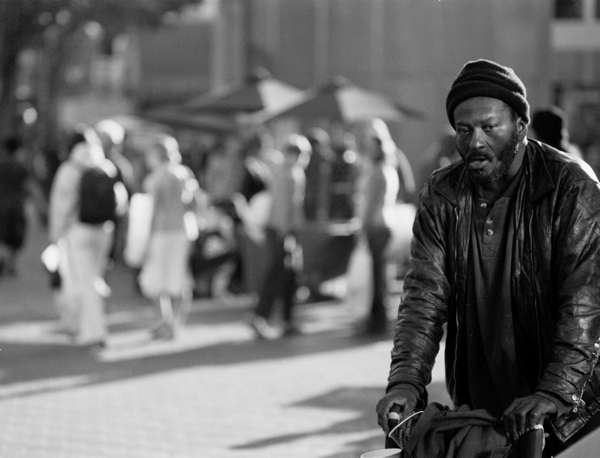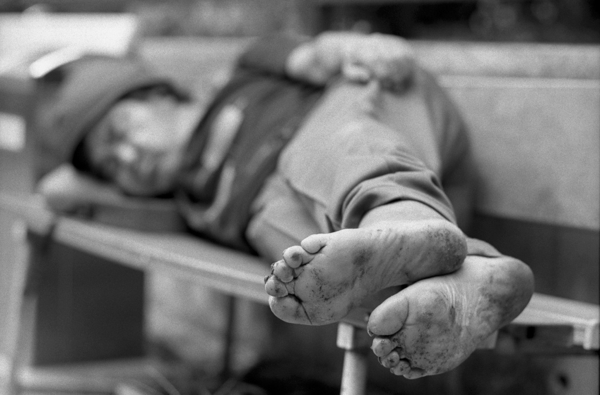



See more Pictures at : http://digital-photography-school.com/17-images-of-poverty
Poverty harms brain power, hard to escape: study
By Sheryl Ubelacker The Canadian Press
TORONTO – Dealing with poverty takes up so much mental energy that the poor have less brain power for making decisions and taking steps to overcome their financial difficulties, a study suggests.
The research, published Thursday in the journal Science, concludes that a person’s cognitive abilities can be diminished by such nagging concerns as hanging on to a place to live and having enough money to feed their families.
As a result, there is less “mental bandwidth” left over for education, training, time-management and other steps that could help break the cycle of poverty, the researchers contend.
“Previous accounts of poverty have blamed the poor for their personal failings, or an environment that is not conducive to success,” said Jiaying Zhao of the University of British Columbia, who led the study, conducted while she was a graduate student at Princeton University.
“We’re arguing that being poor can impair cognitive functioning, which hinders individuals’ ability to make good decisions and can cause further poverty,” she said.
The study had two parts. In the first, about 400 people at a New Jersey mall were randomly selected to take part in a number of standard cognitive and logic tests. The participants’ annual family income ranged from $20,000 to $160,000, with a median of $70,000.
Subjects took the computer-based tests after being presented with a hypothetical financial problem that they would later have to solve: how they would come up with the money to pay for having their car fixed when the cost was either $150 or $1,500.
With the lower amount on their minds, those with low incomes fared as well on the tests as better-off participants. But when the amount was 10 times higher, low-income subjects performed far more poorly on the tests, said Zhao.
On average, a person preoccupied with money problems showed a reduction in cognitive function equivalent to a 13-point drop in IQ or the loss of a night’s sleep.
“It’s a big jump,” she said of the dip in IQ. “It pushes you from average (intelligence) to borderline (mental disability).”
In the second study, the researchers went into the field to test their theory in a real-life situation — with about 460 sugarcane farmers in 54 Indian villages who earn all their yearly income at the time of the annual harvest.
“That creates interesting dynamics because in the months before the harvest, they’re really poor, they’re running out,” Zhao said. “Whereas, in the months right after the harvest, they’re rich.
“So you can literally look within the same individual at how he or she performs when poor versus when rich.”
The researchers found that farmers showed diminished cognitive performance before getting paid for their harvest, compared to after the sugarcane crop was gathered in, when they had greater wealth.
They said these changes in cognitive abilities could not be explained by differences in nutrition, physical exertion or stress.
“So the very context of not having enough resources impedes your cognitive function,” Zhao said. That reduces a person’s mental ability to address elements that could help them break out of poverty, for instance, a higher level of education, a better-paying job and enrolment in social programs to help attain those goals.
“You are simply unable to notice those things when you are preoccupied by poverty concerns.”
The fallout from neglecting other areas of life can exacerbate already trying financial woes, said co-author Eldar Shafir, a professor of psychology and public affairs at Princeton.
Late fees tacked onto unpaid rent and other bills or a job lost because of poor time management can make an already-tight money situation worse, Shafir said in a statement.
And as people become more impoverished, they tend to make decisions that perpetuate their financial hardship, such as excessive borrowing, he added.
The researchers suggest that services for the poor shouldn’t “cognitively tax” them.
Positive measures could include simpler aid forms, more guidance for receiving assistance, and more flexibly structured training and educational programs.
“When (people living in poverty) make mistakes, the outcomes of errors are more dear,” Shafir said. “So, if you are poor, you’re more error prone and errors cost you more dearly. It’s hard to find a way out.”
Dennis Raphael, a professor of health policy and management at Toronto’s York University , said the findings are consistent with previous research on the effects of a lack of “attentional resources” among the poor.
The authors’ recommend that “services for the poor should accommodate the dominance that poverty has on a person’s time and thinking … so that a person who has stumbled can more easily try again,” he said.
Read more@
Source: http://metronews.ca/news/victoria/781039/poverty-harms-brain-power-hard-to-escape-study/
